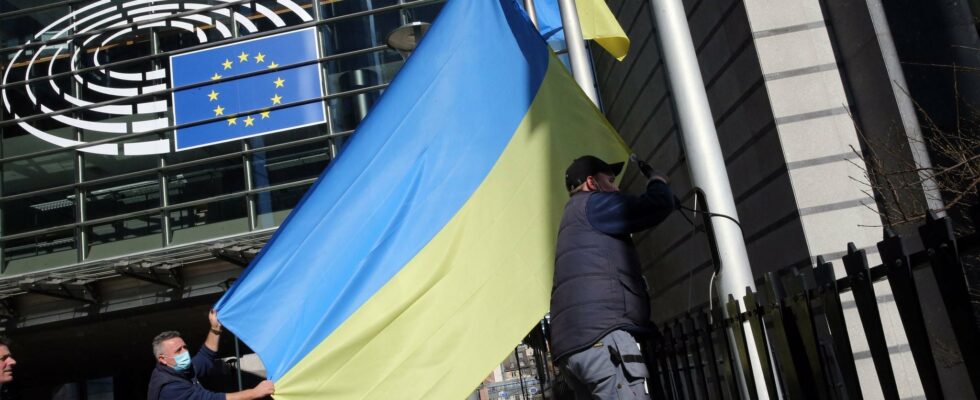“A European dream”, according to Ukrainian President Volodymy Zelensky. The Belgian presidency of the Council of the European Union (which brings together the ministers of the member states) announced last Friday the formal opening this Tuesday, June 25, of negotiations for the entry of Ukraine and Moldova into the EU. But they still have a certain number of steps to take because the membership process is long and complex.
The first steps taken
Former Soviet republics Ukraine and Moldova, as well as Georgia, applied for membership in 2022, shortly after the Russian invasion of Ukraine. After verifying these requests, the European Commission issued an opinion which allowed Ukraine and Moldova to obtain candidate status in June 2022, unanimously by the 27 member states. An EU candidate receives pre-accession financial assistance, in order to implement the reforms necessary for entry.
In December 2023, EU leaders decided to open accession negotiations for these two countries – and at the same time awarded official candidate status to Georgia – but the framework for these negotiations still needed to be validated by the Council of the EU. It is now done and the formal accession negotiations of Ukraine and Moldova to the EU will begin this Tuesday, June 25. Georgia should not move so quickly: the country promulgated a law on “foreign influence” at the beginning of June, which “does not bring Georgia closer to the EU, quite the contrary”, declared the president of the European Council, Charles Michels.
(Very) slow accession negotiations
Accession negotiations should allow Ukraine and Moldova to prepare to “implement EU legislation and standards”, explains the European Union website. For this, three main criteria prevail for the candidates: political (stable institutions guaranteeing democracy, rule of law, human rights, protection of minorities), economic (viable market economy, ability to cope with competitive pressure from EU market and functional (the country has the “capacity to assume the obligations arising from EU membership, including implementing all Union law and adhering to its goals”).
The European Commission, one of the two executive bodies of the EU, monitors the progress of the reforms carried out by the candidate state, “and informs the Council and the European Parliament”.
These negotiations last a long time. The last applications for membership took around ten years to be successful: Hungary and Poland, for example, sent their applications in 1994 and joined the EU in 2004, while Croatia, which applied in 2003, was accepted in 2013. Other currently candidate countries have still not seen their negotiations succeed: Serbia, which became a candidate in 2010 and whose negotiations began 12 years ago, is not yet a member of the European Union.
Accession Treaty
Once the negotiations are completed, the Commission issues an opinion on whether the country is ready to become a member state. If this opinion is positive, an accession treaty is drawn up but the obstacle course is not over: it must then still be approved by all the bodies of the European Union, namely the European Commission, the European Council and the European Parliament, before being “signed and ratified by all EU member states and by the candidate country”, specifies the European Union.
Enlargement by 2030?
The question also arises of knowing when the European Union will be ready to receive a new enlargement – the eighth – because the latter affects, among other things, the budgets of all the Member States. Traveling to the Balkans in August 2023, the President of the European Council, Charles Michel, declared that the EU must be ready “by 2030 for enlargement”. “Integrating new members into our Union will not be easy. It will affect our policies, our programs and their budgets. This will require political reforms and political courage,” he also admitted.
